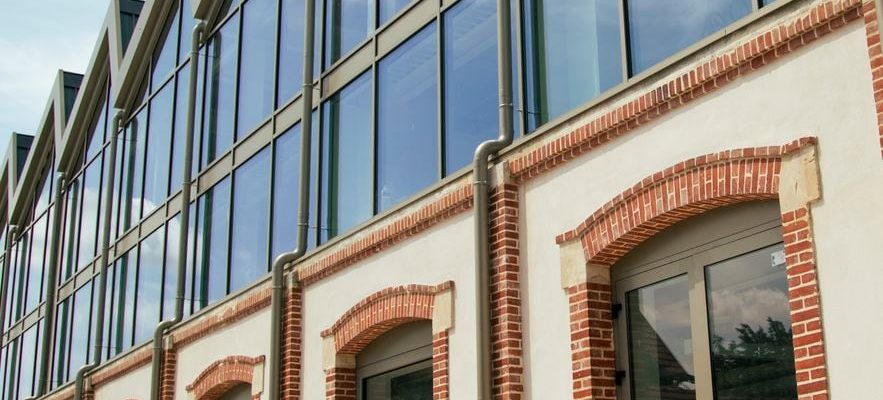The smell of paint, still fresh, tickles the nostrils at the time of the final finishing touches. The calm of the brand new place contrasts with the hustle and bustle that reigns in the adjoining premises, where employees of the Coq Sportif factory in Romilly-sur-Seine, in Aube, are busy on the machines. sewing and clothing cutting devices. This 3,000 square meter extension, decorated with huge bay windows and long wrought iron beams, will double the site’s production. With its modern style, its designers still wanted to preserve the atypical leaning triangle shape of the roof of the historic site. Without the mega contract signed four years ago with the Organizing Committee for the Paris 2024 Olympic Games, this building would perhaps never have seen the light of day and the tricolor brand could have foundered.
The new extension of the Romilly-sur-Seine factory.
© / The Coq Sportif
The news broke on March 9, 2020, a week before France entered its first confinement. That day, the Le Coq Sportif teams learned that they had won two lots of the “equipment manufacturer” call for tenders issued by Paris 2024. The first, entitled “Performance”, provides for the manufacture of equipment for French Olympic athletes. and Paralympics, including kimonos or particularly technical clothing for cyclists. The second, called “Representation”, includes the outfits of the members of the French team for the podiums and the Olympic Village, as well as those of the officials and members of the staff. Added to this are the clothes sold in official stores. In total, 1.3 million parts will be manufactured by the company in Romilly-sur-Seine, and especially in Morocco. “The contract of a lifetime,” relishes the brand director, Patrick Ouyi.
Le Coq Sportif already a partner of the 1924 Paris Olympics
The story is beautiful: during the 1924 Olympic Games in the capital, Le Coq Sportif was already dressing French athletes. A tradition until 1972. “We are extremely proud to have them as partners: they have a strong link with the French team. In addition, they presented a real industrial project in relation to the territory”, explains François- Xavier Bonnaillie, commercial and partnerships director of Paris 2024. The podium outfits of the 840 French athletes will, for example, be exclusively manufactured in Romilly-sur-Seine.
The relationship between the brand and this town of around 15,000 inhabitants, located around forty kilometers from Troyes, has the air of “I love you, me neither”. There was a time when Le Coq Sportif had no less than four factories there. During the first half of the 20th century, it multiplied prestigious partnerships with the Tour de France and the French football team. But from the 1970s, the company, created in 1882 by Émile Camuset, suffered the full brunt of global and particularly Asian competition. In 1974, Adidas became the owner of the brand and gradually organized its relocation, before l’Aube’s final departure in 1988 for Tunisia and South Korea.
Le Coq Sportif will finally make its return twenty years later, under the leadership of the Swiss investment fund Airesis, which had, in the meantime, taken control of it. Today, 160 employees work on site and dozens of hires are planned. For several months, there has been a struggle to meet deadlines. “An organization in commando mode,” recognizes Patrick Ouyi. The stakes are high, because the event must allow Le Coq Sportif to establish itself in high-level sport. “I’ve often had this debate where people said to me: ‘You’d better make it a Lacoste or a Moncler,’” says Marc-Henri Beausire, boss of Airesis and general manager of the company since 2015. But our brand has strong roots in sport, with a popular side that it must maintain.”
Another dimension
For several years, the company manufactured jerseys for the French rugby union team and the AS Saint-Etienne football team, but with the “Performance” contract, it is moving into another dimension. “Positioning ourselves in this field was probably madness or a stroke of genius, we will see that in hindsight,” admits the manager. The company’s various departments worked hard with the federations, at the cost of multiple back and forths, to develop the best equipment in disciplines that the product teams had never had to deal with, such as horse riding or judo. With its share of doubts. “We had to reassure them. Our interlocutors wanted to have the most efficient outfits. They didn’t know us, it was normal for them to ask questions,” concedes Patrick Ouyi. Only athletics, handball, basketball and football have chosen to do without Le Coq Sportif and use their own equipment suppliers. After the Olympics, collaborations could continue with some of them. Above all, the brand hopes to continue the adventure with the French Olympic team in 2028 in Los Angeles.
After several years of losses, linked to the health crisis but also to the repositioning of the model, Marc-Henri Beausire is confident: “Paris 2024 is an extremely important step in development, and will define the next ten years”. The French market currently serves as a prototype for the company, which intends to replicate the model abroad, and more particularly in the United States. “Our patience will pay off,” assures the entrepreneur. On July 13, the sewing machines will stop for a few minutes, time to observe the Olympic flame passing through Romilly-sur-Seine. A symbolic step before the high mass of the summer where Le Coq will finally parade in front of everyone.
.
